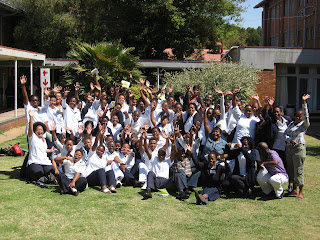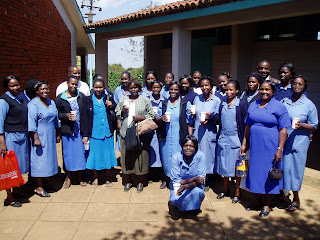 The cohort members described their places of birth as follows: towns (37%), relatively rural areas (36%), cities (15%) and very rural areas (11%).
The cohort members described their places of birth as follows: towns (37%), relatively rural areas (36%), cities (15%) and very rural areas (11%). Wednesday, December 3, 2008
Snapshot of SA Cohort
 The cohort members described their places of birth as follows: towns (37%), relatively rural areas (36%), cities (15%) and very rural areas (11%).
The cohort members described their places of birth as follows: towns (37%), relatively rural areas (36%), cities (15%) and very rural areas (11%). Thursday, November 13, 2008
KENYA: Kakamega MTC joins the cohort study

Kakamega Medical Training College has joined the CREHS cohort study! 34 pre-service nursing students joined the study on 5th November 2009; this brings the cohort total in Kenya to 291 students. Kakamega is in western province, approximately 400 kilometers and 7 hours drive from Nairobi the capital city of Kenya.
Data collection activities ran smoothly and students were happy to join their colleagues from the other three participating colleges, Nairobi, Meru and Muranga MTCs. A second visit to Kakamega, to capture distance learners of the graduating class is planned for January 2009.
Previously collected data was sorted and entry of the SAQs, DCE and EEGs is underway while transcription of FGDs is ongoing. The first cohort follow up call will be made in December 2008 for verification of contact details.
Lastly, we would like to wish the participating students all the best as they prepare for college final examinations due in January 2009.


Tuesday, November 11, 2008
SA: Data entry and contact info verification nearly done

Our next step will be to use the entered data to produce a basic profile of the South African cohort, which we will hopefully be able to post on this website in December. It will then be possible to compare the South African cohort with the Thai one, whose profile is already up on the website.
Until then, good luck with your exam results and with those night shifts that we know some of you are working at the moment!




Tuesday, October 28, 2008
SA completes baseline data collection

 It has taken 3 months, but baseline data collection in South Africa was finally completed on Monday when students from the Mafikeng Campus of North West University became the last group to join the cohort. 42 students participated in this last round, bringing the total number of cohort members to 377.
It has taken 3 months, but baseline data collection in South Africa was finally completed on Monday when students from the Mafikeng Campus of North West University became the last group to join the cohort. 42 students participated in this last round, bringing the total number of cohort members to 377.Data entry will start next week. At the same time, we will also begin the process of verifying the contact details of the students from the first group of nursing training institutions to join the cohort: the Ann Latsky, Mmabatho and S.G. Lourens Nursing Colleges, as well as the University of Johannesburg. Updates on this will be posted in the next few weeks.
Wednesday, October 15, 2008
At last, some news from the Thai nursing cohort!
Since April, 342 nursing students have taken part in data collection activities. They came from 4 colleges scattered all over Thailand (see map below). The first group of 78 students came from a college located in Songkla, in the South of the country. The second group to join (82 students) came from the capital Bangkok. Another 65 students from the Northern city of Chiang Mai followed them, and finally we included in the cohort 117 nursing graduates from Ubon Ratchatani, in the Eastern part of the country.
 Most nursing students in Thailand are female, hence it is not surprising that there are only 16 male cohort members! All the cohort members are very young, with the average age being just over 22 years (the oldest Thai cohort member is only 25 years old!!). None of the Thai cohort members have started their own families yet.
Most nursing students in Thailand are female, hence it is not surprising that there are only 16 male cohort members! All the cohort members are very young, with the average age being just over 22 years (the oldest Thai cohort member is only 25 years old!!). None of the Thai cohort members have started their own families yet. 83% of the Thai cohort were born in rural areas, mostly in the North-Eastern province (around Ubon Ratchatani). Most attended a college in their birth province. However, amongst the cohort members from the North East, a third studied in Bangkok and a further 13% in Chiang Mai in the North.
The South African and Kenyan nursing students are still joining the cohort, but the Thai nurses have already started working. Most of them are expected to work near the college where they studied... to know for sure where they are, stay tuned, as the results of the first follow-up with the Thai nurses will soon be available !
Tuesday, October 14, 2008
NWU joins cohort
The South African cohort now has 335 members. We have already exceeded our initial target of 250 cohort members, but we hope to increase the total to close to 400 with one, final round of data collection in the next few weeks.
Thursday, September 25, 2008
SA and Kenyan cohorts grow further

On the same day, the researchers in Kenya collected data from 31 distance learners from the Murang'a Medical Training College. On the 16th of September, 48 pre-service learners from the same college joined the cohort and a few days before that 29 distance learners from the Meru Medical Training College took part in the baseline data collection activities. Below is a picture of some of the participants from Meru.

Watch this space!!
Thursday, September 4, 2008
The Cohort Study just started in Kenya

Refreshments were ready to help the students through all the data collection tools, and in the end, everybody seemed quite happy to have participated !

Those 55 students from Nairobi MTC are the first members of the Kenyan cohort, but they should soon be joined by others.


Early next week, more data collection at the Nairobi MTC will take place to include distance learning students. Soon after, other MTCs outside of Nairobi will also be visited, and more Kenyan nursing students will join their South African and Thai colleagues as CREHS cohort members!
Thursday, August 28, 2008
SA cohort study gets first university students


Including the 20 UJ students, the South African cohort now has 253 members.
In South Africa, the CREHS Cohort Study is being implemeted in North West and Gauteng Provinces. UJ was the last data collection site in Gauteng. We hope to finish the fieldwork in North West by the end of September 2008.
Thursday, August 14, 2008
Data collection in South Africa
The first 37 members of the cohort came from the Mmabatho College of Nursing in North West They joined the cohort on 25 July.


Three days later, o






In South Africa, baseline data collection is being planned in three more nursing training institutions. More updates on that to follow... In the meantime, why not let us know what you think about this website and your experience of the research so far? You can either write a comment or give us a quick feedback through the survey on the right hand side of the page.
About the CREHS Cohort Study and this website
The CREHS Cohort Study is an exciting, innovative research project that is being carried out in Thailand, South Africa and Kenya. The basic idea is to recruit final-year nursing students in these countries into a cohort/long-term research group and to collect information from them about their career choices and the things they value in their professional lives and working environments. This information will be useful in making recommendations about how to improve the work experiences and retention of health workers in the health systems where they are needed most.
Over the next year or so, the research will involve three key steps:
- Baseline data collection, which usually takes place in selected nursing training institutions before the students graduate. This entails the completion of several questionnaires, conducting focus group discussions and collecting participants' contact details so that they can be reached at a later stage. Baseline data collection was completed in Thailand in March 2008, is underway in South Africa and should start in Kenya at the end of the month.
- Cohort contact, in terms of which the researchers will contact members from time to time to verify contact details and get a very quick update on their professional situation.
- Follow up, which will involve further detailed data collection with the cohort members. This will take place approximately one year after the baseline data collection.
WHY THIS PAGE?
Over time, we hope to stay in touch with as many of the cohort members as possible. This internet page has been created to try and keep contact and to share pictures, findings from the research and general news, especially news about the lives and work experiences of the cohort members.
So, stay online and don't hesitate to send us your comments or suggestions about how this website can be improved and about what information you would like to see on it.
News that will appear on this page very soon include:
- updates about the baseline data collection in South Africa
- the first findings to emerge from the research in Thailand.

